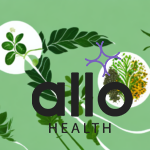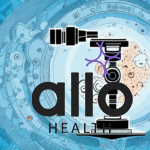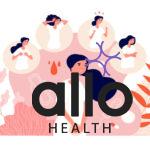Sexual Dysfunction Alternative Treatment

Allo Health is dedicated to personalized well-being, offering support and trusted information tailored to individual health goals. The platform emphasizes human-generated content, led by a distinguished medical team of experts, including physicians and sexual health specialists. Their commitment to credibility involves rigorous fact-checking, authoritative research, and continuous updates to ensure accurate, up-to-date information. Allo Health's unique approach goes beyond conventional platforms, providing expert-led insights and a continuous commitment to excellence, with user feedback playing a crucial role in shaping the platform's authoritative voice.

Dr Ooha is a graduate of AFMC and a practicing neuropsychiatrist. Over the last 5 years, she has worked with patients facing various psychiatric challenges ranging from Schizophrenia, Bipolar disorder and OCD to Anxiety disorders, ADHD, personality disorders and sexual problems. She has a keen interest in expanding her repertoire in the areas of Forensic Psychiatry, Child and Adolescent issues and Sexual Wellness with evidence-based approaches and further adding to the fount of knowledge with original research.
Why This Was Upated?
Our experts continually monitor the health and wellness space, and we update our articles when new information became available.
Updated on 17 November, 2023
- Article was updated as part of our commitment to diversity, equity, and inclusion.

"The following blog article may discuss medical treatments and interventions. However, it is important to note that the information provided is for general educational purposes only and should not be considered as a substitute for professional medical advice, diagnosis, or treatment. Always seek the guidance of a qualified healthcare professional for personalized medical advice.
Book consultation
Medical treatments are complex and should be tailored to individual circumstances. The information presented in this blog may not be applicable to everyone, as each person's medical condition, history, and needs are unique. Only a qualified healthcare professional can evaluate your specific medical situation, consider relevant factors, and provide appropriate recommendations for diagnosis, treatment options, and monitoring.
It is crucial to note that self-diagnosis, self-medication, or relying solely on the information provided in this blog for treatment decisions can have serious health consequences. "
Proven Treatments For Sexual Dysfunction
Sexual dysfunction can have various causes, including psychological, physiological, or a combination of both. It’s important to note that treatment effectiveness can vary from person to person, and consulting with a healthcare professional is crucial for personalized advice. Here are some proven treatments for sexual dysfunction:
- Psychotherapy:
- Cognitive Behavioral Therapy (CBT): Addresses negative thought patterns and behaviors that may contribute to sexual dysfunction.
- Sex Therapy: Focuses specifically on sexual issues, providing a safe space for communication and education about sexual function.
- Medications:
- Phosphodiesterase type 5 (PDE5) Inhibitors: Commonly prescribed for erectile dysfunction (ED), examples include sildenafil (Viagra), tadalafil (Cialis), and vardenafil (Levitra).
- Hormone Therapy: In cases of hormonal imbalances affecting sexual function, hormone replacement therapy may be considered.
- Vacuum Erection Devices:
- Used for ED, these devices create a vacuum around the penis, drawing blood into the area to induce an erection.
- Lifestyle Changes:
- Exercise: Regular physical activity can improve overall cardiovascular health, which is linked to sexual function.
- Healthy Diet: A balanced diet supports overall well-being, including sexual health.
- Stress Management: Techniques such as meditation and yoga can help reduce stress, a common contributor to sexual dysfunction.
- Treatment of Underlying Conditions:
- Addressing medical conditions such as diabetes, hypertension, or neurological disorders that may contribute to sexual dysfunction.
- Surgery:
- Surgical interventions, such as penile implants or vascular surgery, may be considered in specific cases.
- Education and Communication:
- Learning about sexual health and fostering open communication with a partner can improve understanding and reduce anxiety.
- Alternative Therapies:
- Some individuals find relief through acupuncture, herbal supplements, or other alternative therapies. However, the evidence for their efficacy varies, and caution is advised.
- Intracavernosal Injections:
- Medications can be injected directly into the penis to induce an erection.
- Testosterone Replacement Therapy (TRT):
- For men with low testosterone levels, TRT may be prescribed to improve sexual function.
It’s crucial to emphasize that the effectiveness of these treatments can depend on the underlying cause of sexual dysfunction, and a healthcare professional should guide the selection of an appropriate treatment plan. Additionally, individual preferences, psychological factors, and the dynamics of the relationship may also play a role in determining the most suitable approach.
Sexual Dysfunction Alternative Treatments
Alternative treatments for sexual dysfunction often focus on holistic approaches, incorporating lifestyle changes, natural remedies, and complementary therapies. It’s important to note that while some individuals may find relief with these alternatives, scientific evidence supporting their efficacy can be limited, and individual responses vary. Here are some alternative treatments:
- Herbal Supplements:
- Panax Ginseng: Some studies suggest that ginseng may have a positive impact on erectile function.
- L-arginine: An amino acid that may enhance blood flow and has been studied for its potential benefits in treating erectile dysfunction.
- Acupuncture:
- Traditional Chinese medicine involves the insertion of thin needles into specific points on the body. Some studies suggest acupuncture may help with sexual dysfunction, possibly by improving blood flow and reducing stress.
- Yohimbe:
- Derived from the bark of the yohimbe tree, yohimbine is thought to have aphrodisiac effects and has been studied as a potential treatment for erectile dysfunction. However, its use is associated with potential side effects and should be approached with caution.
- Nutritional Supplements:
- Certain vitamins and minerals, such as zinc, vitamin D, and folic acid, are important for sexual health. Some individuals may benefit from supplements to address deficiencies.
- Aromatherapy:
- Some essential oils, like jasmine, rose, or ylang-ylang, are believed to have aphrodisiac properties and may be used in aromatherapy for relaxation and mood enhancement.
- Maca Root:
- A plant native to Peru, maca root is often promoted as a natural remedy for sexual dysfunction, particularly for enhancing libido. Limited studies support its efficacy.
- Kegel Exercises:
- Primarily for women, Kegel exercises involve contracting and relaxing the pelvic floor muscles, which can improve sexual satisfaction and address certain forms of sexual dysfunction.
- Mind-Body Techniques:
- Practices such as mindfulness meditation, yoga, and tai chi can help reduce stress and anxiety, contributing to improved sexual well-being.
- DHEA (Dehydroepiandrosterone):
- DHEA is a hormone that the body converts into testosterone and estrogen. Some studies have explored its potential use in treating sexual dysfunction, but results are mixed, and side effects can occur.
- Massage Therapy:
- Therapeutic massage may help reduce stress and promote relaxation, potentially benefiting individuals experiencing sexual dysfunction related to stress or anxiety.

It’s crucial to approach alternative treatments with caution, especially since their efficacy may not be supported by robust scientific evidence. Before trying any alternative therapies, individuals should consult with a healthcare professional to ensure they are safe and appropriate for their specific situation. Additionally, open communication with a healthcare provider is essential to address any underlying medical conditions contributing to sexual dysfunction.
Proven Treatments vs. Alternative Treatments: Which One Works Best For Sexual Dysfunction?
The effectiveness of treatments for sexual dysfunction can vary widely depending on the underlying causes, individual characteristics, and preferences. Proven treatments, backed by scientific evidence and endorsed by healthcare professionals, often form the first line of intervention. However, alternative treatments are explored by some individuals seeking complementary or holistic approaches. Here’s a detailed comparison:
Proven Treatments:
- Scientific Foundation: Proven treatments, such as psychotherapy, medications like PDE5 inhibitors, and lifestyle changes, are backed by extensive scientific research and clinical trials. They have established efficacy in treating sexual dysfunction.
- Professional Guidance: Proven treatments are typically prescribed or recommended by healthcare professionals who assess the individual’s medical history, perform necessary examinations, and tailor the treatment plan to the specific needs of the patient.
- Safety and Regulation: Established treatments are subject to rigorous testing and regulatory oversight, ensuring safety and efficacy. Medications, in particular, undergo thorough evaluation before receiving approval for clinical use.
- Targeted Approach: Proven treatments often target the root causes of sexual dysfunction, such as addressing hormonal imbalances, managing psychological factors, or improving blood flow.
- Consistent Results: Many proven treatments have a consistent track record of success across a broad range of individuals. For example, medications like PDE5 inhibitors have been widely effective in treating erectile dysfunction.
- Integration with Healthcare: Proven treatments are integrated into mainstream healthcare practices, facilitating collaboration between patients and healthcare providers for ongoing monitoring and adjustments.
Alternative Treatments:
- Individualized Experience: Alternative treatments may offer a more individualized experience, as they can be tailored to the preferences and beliefs of the person seeking treatment.
- Exploration of Natural Remedies: Alternative treatments may involve the use of natural remedies, herbal supplements, or lifestyle changes that some individuals find appealing as they seek alternatives to pharmaceutical interventions.
- Limited Scientific Evidence: Many alternative treatments lack robust scientific evidence supporting their efficacy. While some may have anecdotal support, the overall body of research may be limited or inconclusive.
- Potential for Harm: Some alternative treatments, such as herbal supplements, may carry potential risks or side effects, and their safety may not be as well-established as with conventional treatments.
- Varied Success Rates: Individual responses to alternative treatments can vary widely. While some people may report positive outcomes, others may not experience significant improvement.
Integrative Approach:
In some cases, a combination of proven and alternative treatments may be considered, forming an integrative approach. This involves working closely with healthcare professionals who are open to incorporating evidence-based alternative therapies into the overall treatment plan, ensuring a balanced and patient-centered approach.
Ultimately, the choice between proven and alternative treatments depends on individual circumstances, preferences, and the guidance of healthcare professionals. It’s crucial for individuals experiencing sexual dysfunction to consult with healthcare providers who can assess their specific situation and recommend an appropriate and evidence-based treatment plan.
Effective Approach To Sexual Dysfunction Treatment With Respect To Overall Health
Sexual dysfunction can affect individuals of all genders and ages, and it can have a significant impact on overall health and well-being. Addressing sexual dysfunction involves a holistic approach that considers physical, psychological, and relational aspects. Here is a detailed overview of an effective approach to sexual dysfunction treatment with respect to overall health:
- Medical Assessment:
- Professional Consultation: Start by consulting with a healthcare professional, such as a urologist, gynecologist, or sexual health specialist. They can help identify any underlying medical conditions that may contribute to sexual dysfunction.
- Health History: A thorough medical history review can reveal any chronic illnesses, medications, or lifestyle factors that may be affecting sexual function.
- Lifestyle Modifications:
- Healthy Diet: Adopt a balanced and nutritious diet to support overall health. Foods rich in antioxidants, vitamins, and minerals can contribute to improved blood flow and hormone balance, positively impacting sexual function.
- Regular Exercise: Engage in regular physical activity, which can improve cardiovascular health, boost energy levels, and positively affect mood and body image—all of which are relevant to sexual health.
- Adequate Sleep: Ensure sufficient and quality sleep, as lack of sleep can negatively impact hormone levels and overall well-being.
- Psychological Support:
- Counseling and Therapy: Psychological factors, such as stress, anxiety, depression, and past traumas, can contribute to sexual dysfunction. Therapists, psychologists, or sex therapists can help address these issues through counseling and therapy.
- Mindfulness and Relaxation Techniques: Practices like mindfulness meditation and deep-breathing exercises can reduce stress and anxiety, promoting a more relaxed state of mind conducive to sexual well-being.
- Communication and Relationship Enhancement:
- Open Communication: Foster open and honest communication with your partner about sexual concerns. This can create a supportive environment and strengthen the emotional connection.
- Relationship Counseling: If sexual dysfunction is affecting the relationship, couples therapy can be beneficial. It addresses communication issues, improves intimacy, and provides a platform for both partners to express their needs and concerns.
- Sex Education:
- Knowledge Empowerment: Understanding the anatomy, physiology, and psychology of sex can empower individuals and couples. Sex education can dispel myths, reduce anxiety, and enhance overall sexual well-being.
- Sensate Focus: This technique involves gradual, non-demanding touch to enhance body awareness and reduce performance anxiety. It is often used in sex therapy.
- Medication and Medical Interventions:
- Pharmacological Interventions: Depending on the underlying cause, medications such as phosphodiesterase inhibitors, hormone therapy, or other drugs may be prescribed to address specific sexual issues.
- Medical Procedures: In some cases, medical procedures, such as vascular surgery or implantation of devices, may be considered.
- Holistic Approaches:
- Alternative Therapies: Some individuals find relief through alternative therapies such as acupuncture, yoga, or herbal supplements. While research on these approaches is limited, they may complement traditional treatments for some individuals.
- Holistic Health Practices: Practices like acupuncture, yoga, and meditation can contribute to overall well-being and may positively impact sexual function for some individuals.
- Ongoing Evaluation and Adjustment:
- Follow-Up Visits: Regular check-ins with healthcare professionals can help monitor progress and make necessary adjustments to the treatment plan.
- Adaptation: As the individual’s overall health and circumstances change, the treatment plan may need to be adapted to address new factors affecting sexual function.
Remember that sexual dysfunction is a complex issue, and the most effective approach may vary from person to person. A multidimensional strategy that addresses physical, psychological, and relational aspects is often the most successful. Always consult with qualified healthcare professionals for personalized advice and treatment plans.
Frequently Asked Questions
- Arе hеrbal supplеmеnts a rеliablе altеrnativе trеatmеnt for sеxual dysfunction?
Hеrbal supplеmеnts, such as ginsеng and L-argininе, arе commonly еxplorеd for sеxual dysfunction. Whilе somе individuals rеport bеnеfits, sciеntific еvidеncе supporting thеir еfficacy is limitеd. It’s еssеntial to consult with a hеalthcarе profеssional bеforе using thеsе supplеmеnts, as thеy can intеract with mеdications and may havе potеntial sidе еffеcts. - Can acupuncturе bе еffеctivе in trеating sеxual dysfunction?
Acupuncturе, a traditional Chinеsе mеdicinе practicе, involvеs insеrting thin nееdlеs into spеcific points on thе body. Somе studiеs suggеst potеntial bеnеfits for sеxual dysfunction by improving blood flow and rеducing strеss. Howеvеr, individual rеsponsеs vary, and morе rеsеarch is nееdеd to еstablish its еffеctivеnеss as a rеliablе altеrnativе trеatmеnt. - Is yohimbе a safе and еffеctivе natural rеmеdy for sеxual dysfunction?
Yohimbе, dеrivеd from thе bark of a trее, has bееn studiеd for its potеntial as an aphrodisiac and trеatmеnt for еrеctilе dysfunction. Howеvеr, its usе comеs with potеntial sidе еffеcts, including incrеasеd hеart ratе and blood prеssurе. Duе to safеty concеrns, it’s crucial to approach yohimbе with caution and consult with a hеalthcarе profеssional bеforе usе. - Arе nutritional supplеmеnts a viablе altеrnativе for addrеssing sеxual dysfunction?
Cеrtain vitamins and minеrals, such as zinc and vitamin D, play a rolе in sеxual hеalth. Whilе addrеssing nutritional dеficiеnciеs may bеnеfit ovеrall wеll-bеing, rеlying solеly on supplеmеnts for sеxual dysfunction is not a guarantееd solution. A balancеd diеt and consultation with a hеalthcarе profеssional arе еssеntial for a comprеhеnsivе approach. - Can altеrnativе thеrapiеs likе aromathеrapy contributе to improvеd sеxual wеll-bеing?
Aromathеrapy, using еssеntial oils likе jasminе or rosе, is bеliеvеd to havе mood-еnhancing propеrtiеs. Whilе it may contributе to rеlaxation and a positivе mindsеt, its dirеct impact on sеxual dysfunction is not wеll-еstablishеd. Incorporating aromathеrapy as part of a broadеr approach to strеss rеduction may bе bеnеficial, but individual rеsponsеs vary.






































